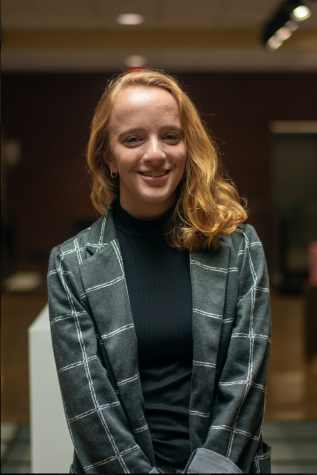It’s typical for the start of a term to bring about some changes. This year at Chatham University, many feel like they’re struggling to keep up with all of them ever since the University announced its decision to begin a campus-wide reorganization under the new leadership of President Dr. Rhonda Phillips.
The reorganization process was announced to faculty, staff and students on June 26 in an email from Board of Trustees Chair David Hall. Through the reorganization, the University stated it would need to realign a budget deficit of $8 million to $12 million attributed to the loss of a long-term tenant at Chatham’s Eastside location, rising costs of University maintenance and declining graduate enrollment.
In an interview with the Communiqué, Dr. Phillips stated the deficit was “well over $12 million” but has been decreased to nearly $6 million through various measures, including department integrations and restructuring, employee benefit cuts and cuts to administrative, non-unionized staff positions. She also stated that a large portion of the deficit was decreased through a thorough review of goods and services contracts to establish the most cost-efficient operational processes.
The integration of the Registrar with Enrollment Management, Student Accounts and Financial Aid offices was announced on June 26 and started soon after, according to Vice President of Marketing and Communications Bill Campbell. On Aug. 3, the University announced to faculty and staff the integration of Jennie King Mellon Library with Information Technology Services and the creation of the Academic Success Division, which brought together Academic Advising, Office of Academic Accessibility Resources, Career Development, Internships and International Affairs.
The next phase of the reorganization process involves a comprehensive review of Chatham’s undergraduate and graduate programs. Many community members who spoke with the Communiqué expressed frustrations about what they consider to be a lack of communication throughout the process and concerns for the future of academic programs.
“We know nothing,” said Jennie Sweet-Cushman, an associate professor of political science at Chatham. “There’s not a whole lot being formally communicated, and that’s just how fear breeds.”
The University made staff cuts in early August, eliminating approximately 20 positions in an effort to increase operational efficiency. However, for many of those in affected departments, they said this resulted in an increased workload for those who remained and slower responses to the needs of students.
“For a lot of student-facing offices, when a lot of these changes were happening, we were in preparation for the fall semester,” said Kate Emory, an International Student and Scholar Services Coordinator in International Affairs. “We were already really swamped, and then a lot of changes happened quickly. In terms of processing those changes, it’s still ongoing.”
The University created a Frequently Asked Questions page for faculty and staff on My.Chatham.edu in mid-July as an avenue for feedback from community members. However, the internal Web page didn’t appear to get updated much until mid-August.
“We would check it daily, and it was nothing, nothing, nothing,” Emory said. “It wasn’t until the morning of the fall update that I saw any updates to the Q&A page.”
Due to privacy concerns, the University was unable to disclose information about which positions were cut in any formal announcement to staff and faculty. Staff and faculty who spoke to the Communiqué said that the lack of information added to the confusion, as emails continued to go through to individuals who had left the University.
And staff and faculty weren’t the only ones whose plans for the fall term were forced to change. Some students entering Integrated Degree Programs (IDP) received emails on July 27 stating that enrollment to graduate programs were put on pause for the fall 2023 term, meaning there would be no enrollment in the fall 2023 or spring 2024 terms.
Several students who spoke to the Communiqué shared that their academic advisors weren’t even aware of the pause until their advisees reached out to them.
“We understand this is inconvenient and may pose challenges to your educational plans,” wrote Vice President of Enrollment Management Amy Becher in an email to affected students. “We do not want your educational investment and experience to be diminished in any way.”
When asked about the pause on graduate programs, Dr. Phillips said that the pause did not necessarily mean a program was going to be cut.
“Our goal is to make these programs better and stronger,” she said. “There may be a couple programs that have sort of outlived their market appeal, so those programs may be on hiatus for a while to figure out if there’s a way to make them stronger.”
For Allie Corser-James ‘24, a student who intended to pursue the film and digital technology IDP for a master’s, waiting to hear about the future of the program has changed her educational plans. Because Corser-James was notified a month before the term started, she had difficulties finding alternative courses to fill her schedule.
“The pause, for me, means that I’m not doing graduate school right now,” she said.
Some student employees and student organization officers have also acknowledged that the staff cuts have impacted the student experience because decreased staff members in Student Engagement and Residence Life have limited the departments’ capacities.
“It’s been confusing because, working on campus, my bosses are completely overworked,” said Fiona Lilly ‘25, who works in Residence Life as a residence assistant. “The fewer people there are, the more work we have to do to make up for it. So it’s not great.”
She added that as the vice president for Sustainability Explorer Post and the treasurer of Chatham Tabletop Gaming Club, she’s noticed communication with the Student Engagement office has been slower and more difficult since staff cuts were made.
While staff, faculty and students have expressed frustrations about the communication of the reorganization, many agreed that it was time to reevaluate Chatham’s operations, and they remained optimistic that the restructuring of departments would be beneficial to the long-term student experience.
“The end result will make sense,” Emory said. “Certain processes were very antiquated, and there were a lot of things that just never got updated. … I feel like they are trying their best to, even with hard decisions, to move forward. I just hope the communication develops.”
Dr. Phillips said she is open to suggestions from the Chatham community regarding communication.
“Things can always be improved,” she said. “I’m trying not to send out so much that is negative. I want to share things that are very positive and things that we are doing well at Chatham. I know that this is an unusual time because of the deficit. … I’d love some suggestions of what students would like to hear. I don’t want to inundate people with email after email.”




Abbey • Sep 20, 2023 at 1:22 pm
I really appreciate this article and the Communique’s (longstanding) dedication to transparency, especially in a situation where so much confusion is flowing.
Sara • Sep 20, 2023 at 7:03 pm
Real transparency is being honest about why you lost $12 million?